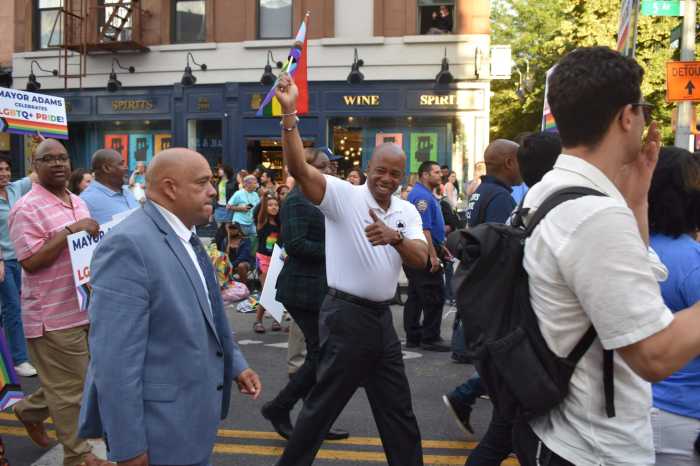As the New York Times reported on June 16, the Democratic primary to succeed Brooklyn Congressman Edolphus Towns has suddenly become a horserace.
Many establishment figures in the party, the newspaper reported, are alarmed at the prospect that City Councilman Charles Barron, a fiery and contentious figure widely seen as divisive on issues ranging from race to Israel, could actually outpace Assemblyman Hakeem Jeffries in the June 26 primary, the winner of which is a sure bet to replace Towns after the November general election.
One difference –– among many –– between the two men is on the issue of marriage equality. Every time gay marriage was put to a vote in the State Assembly –– from 2007 until its enactment last year –– Jeffries voted yes. In contrast, Barron, in an interview with Capital New York’s Azi Paybarah late last year, made clear, “I’m against same-sex marriage.”
In a 2009 speech during the Assembly floor debate on marriage, Jeffries recalled taking a college class from Barbara Jordan, a ‘70s-era Democratic congresswoman and later a professor, who died in 1996.
“In many ways, Barbara Jordan is a paradigm case for diversity,” Jeffries said. “She's black. She's a woman. She was disabled. She was a lesbian, and she was from Texas –– a paradigm case for diversity. And Congresswoman Barbara Jordan once said in a famous 1976 speech that when those words in the Declaration of Independence were written, ‘All men are created equal,’ that they weren't meant to apply to people who look like her. But it was only through centuries of legislation and agitation and court interpretation and judicial opinion that some measure of legitimacy was breathed into those words. And when you think about that it's so clear because when they were written and for decades afterwards –– millions of African slaves who were enslaved, victimized, brutalized, lynched, raped, kidnapped, discriminated against, those words were not applicable to them.”
Then, likening Jordan to other heroes of the African-American civil rights struggle, Jeffries said, “I don’t believe that these great Americans, these heroes of my community, these beacons of liberation, these freedom fighters worked so hard and in some cases died simply so that all African Americans would be treated equally. I believe that they did what they did so that all Americans would be treated equally.”
In his 2011 comments to Paybarah, Barron, who from the beginning of her tenure as City Council speaker has famously fought with Christine Quinn, made clear he drew different lessons from African Americans’ history in the US. About marriage equality he said, “I don’t consider it a civil rights issue of our time. Comparing it to our struggle when we were stolen from Africa, enslaved, murdered, raped, hung, lynched. I’m not even going to give it the same breath as our movement in this country.”
Citing oft-repeated cases of outlandish behavior by Barron –– such as calling Zimbabwe’s Robert Mugabe and Libya’s Muammar Gaddafi his heroes –– the Times quoted former Mayor Ed Koch terming him a “viper” and said the Anti-Defamation League has put out a reporter’s cheat sheet of his most objectionable statements.
A more subtle –– but in its own way, deadly –– critique of Barron came from Brooklyn Congresswoman Yvette Clarke, a Jeffries supporter, who said Barron has a “style of politics that appeals to some groups” while her candidate represented “the future of Brooklyn.”
According to the Times, Barron’s momentum has come from his endorsement by Towns and by the powerful DC 37, the city’s largest public employees union. Still, Jeffries has raised nearly $800,000 for the race, while Barron missed the latest federal campaign filing deadline. He told the Times he had about $70,000 on hand, much of that from his own pocket.
Jeffries was first elected to the Assembly in 2006, so his first marriage equality vote came during his initial six months in office. He has recently been focused on reform of the state's marijuana laws to curb the large number of arrests –– many of them involving young men of color –– of New Yorkers who are ordered to empty their pockets during a stop and frisk and then arrested for displaying the drug in public. Republican resistance to such reform led to the Legislature adjourning this week without taking any action on the issue.

































